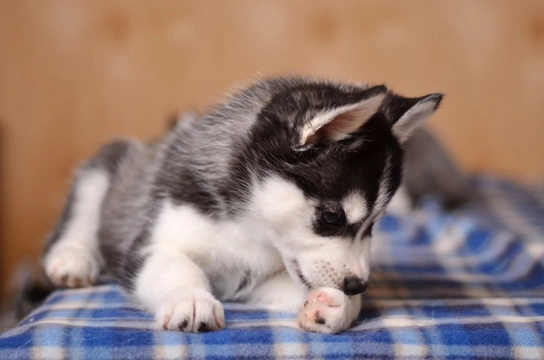
Why do dogs lick their wounds, and does this help with healing?
The phrase “retreating to lick one’s wounds” is one that most people are familiar with, and the origins of this phrase comes from the behaviour of animals like cats and dogs, which when injured, usually look for a quiet space to retreat to in order to recuperate and literally, lick their wounds to make themselves feel better.
This behaviour is so common and innate to animals like dogs that after they’ve had a surgery or if they have an injury on their bodies, most vets will provide you with a buster collar to prevent your dog from licking and bothering at the wound, and they may advise you on other ways to stop this from happening too.
However, like most evolved behaviours displayed by animals like dogs, licking wounds can, in some situations, help with healing; although it also comes with some risks. If you’ve ever wondered why dogs lick their wounds and whether or not doing so actually helps wounds to heal, this article will tell you the answer.
Read on to learn why dogs lick their wounds and whether or not this is helpful.
What prompts dogs to lick their wounds?
As most of us know from having a cut or injury ourselves, it can be hard to leave scrapes or wounds alone and avoid touching and bothering them, and many wounds will feel itchy or tight as they start to heal, which makes it even harder to manage.
The same is true for dogs, and also, dogs don’t know instinctively that wounds are usually best left alone – and because dogs don’t have hands and fingers to investigate with, they use their mouths instead.
A wounded dog might lick their injury to soothe the pain and cool the inflammation, clean the area, and potentially simply because it is hurting, irritating or bothering them. Licking and grooming in this way can also serve as a soothing mechanism for dogs too, to help to calm them down and feel less unsettled or sorry for themselves.
Can licking help wound healing?
Your dog’s saliva contains a number of compounds that can potentially ease the pain of injuries and even in some cases, promote healing.
There are several antiviral and antibacterial compounds in dog saliva, including thrombospondin, lactoferrin and cystatins, and lysozyme and peroxidase, the latter of which actually destroys gram-positive bacterial strains on a cellular level.
Compounds involving nitrates also inhibit the growth of bacteria, and there’s also a protease inhibitor found within dog saliva too, which can speed up the time it takes for a wound to heal.
Additionally, there’s a naturally occurring pain reliever in dog saliva called opiorphin, and epidermal growth factors that can again, shorten the time it takes for the wound to heal.
Altogether, your dog’s saliva is packed with compounds and enzymes that not only help them to swallow and digest food, but that also keep the body healthy and help to support the dog’s immune system and fight off infection.
Additionally, if the wound in question is dirty (with bacteria or actual dirt) licking it helps to clean away debris and also, stimulate the circulation.
Can licking hinder wound healing?
Given the power-packed cocktail of enzymes and compounds in dog saliva, it might seem as if we should allow dogs to lick their wounds and use the power of nature to help with healing. However, the problem with this is that your dog’s saliva isn’t sterile, and there is more hitching a ride in dog spit than just helpful enzymes!
Dogs aren’t particularly clean animals, and given that they explore the world with their mouths, a lot of bad stuff can also be found in dog saliva too. Food particles and bacteria are par for the course, and unless your dog’s teeth and gums are in peak condition, there is already some harmful bacteria and potential dental problems that impact the environment within your dog’s mouth and so, their saliva.
Added to this, dogs groom themselves with their tongues, including licking their butts and genitals, which means that faecal traces are often found in their mouths too, and none of this is good for wounds.
Whilst the good stuff in dog saliva can on its own potentially aid healing or at least, not cause any harm, when you factor in the negatives too, the risks outweigh the benefits.
Should you let your dog lick their wounds?
It isn’t a good idea to let your dog lick a wound, because doing so might introduce bad bacteria and other problems that don’t cause an issue in health, but that can increase the risk of an infection if introduced to a wound, compromising recovery and potentially even worsening the problem.
Additionally, when your dog licks their wound they might also cause further harm by irritating it, or even picking or compromising any sutures or closures used to knit the wound together.
If your vet supplies a buster collar or other equipment to prevent your dog from licking their wound, always use it, and follow their advice on how to clean and care for the wound at home.
If you have any concerns about wound healing or infection, always contact our vet for advice on how to proceed.



